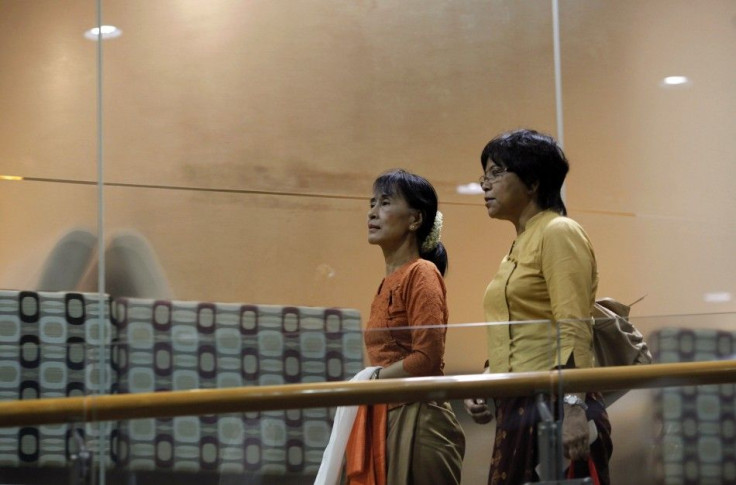A Tale Of Two Nations: Suu Kyi Will Find Thailand A Stark Contrast To Native Myanmar

Renowned pro-democracy activist Aung San Suu Kyi has arrived in Thailand, marking the first time she has been out of her native Myanmar (Burma) in 24 years.
Suu Kyi, who won a seat in parliament last month, has emerged as the face of democratic reforms in a country that was ruled by a repressive military regime for more than 50 years, prior to the emergence of a nominally civilian government in 2010.
She had spent 15 of the past 24 years under house arrest and refrained from leaving the country out of fear she would never be permitted to return.
Since her historic election, Suu Kyi has entertained a number of prominent foreign leaders, including British Prime Minister David Cameron and Indian Prime Minister Manmohan Singh, as a symbol of Myanmar’s gradual return to the community of nations.
The United States and the European Union, among other entities have eased long-held sanctions on Myanmar, although they have not eliminated them entirely (including the ban on selling weapons to the Southeast Asian country), pending additional democratic reforms.
Suu Kyi will be attending the World Economic Forum on East Asia in Bangkok, where she is expected to speak on the changing role of Asian women.
Prior to departing from the Rangoon airport, Suu Kyi told reporters that she will stay four or five days in Thailand and also visit a refugee camp. About 130,000 Burmese refugees who fled persecution in their native country are living in camps in Thailand.
Pavin Chachavalpongpun, lead researcher at the Centre for Southeast Asian Studies in Japan's Kyoto University, told Agence France Presse that Suu Kyi is very confident in her position, confident with the ongoing reconciliation and political reforms.”
He added: Before the sanctions can be [completely] removed, the government have to earn legitimacy… so that is what they want from Suu Kyi's trip.”
Bangkok, which is only about 360 miles away from Rangoon, presents a dramatic contrast to her homeland. The Thai capital is a gleaming, modern, sophisticated metropolis, while Rangoon is backward, decaying and susceptible to chronic power shortages.
Indeed, according to the CIA Factbook, Thailand’s economy rebounded from the global financial crisis by expanding 7.8 percent in 2010 (while heavy floods stalled economic growth last year). The economy is expected to bounce back this year by growing between 5.5 percent and 6.5 percent. Thailand boasts a GDP of some $346 billion (or $9,700 per capita), while only about 8 percent of the population lives below the poverty line.
Thailand also features excellent infrastructure, pro-business government polices and a robust export sector.
In stark contrast, Burma, which is awash in poverty and tight state control, has a GDP that is one-seventh as large as its neighbor. Almost one-third of Burmese live in poverty, making it the most indigent nation in Southeast Asia.
In Thailand, Suu Kyi will meet the high and mighty (including Prime Minister Yingluck Shinawatra), but also the humble and downtrodden (Burmese migrant workers).
Thitinan Pongsudhirak, of Bangkok's Chulalongkorn University, commented to AFP: This is a hugely symbolic but also substantive visit because it is going to mark the beginning of Aung San Suu Kyi as an international stateswoman. She is a rock star in international politics so she will inevitably, I think by circumstance more than by design, overshadow everybody, she will steal the show.”
Next month, Suu Kyi will voyage to Europe, where she is expected to make a speech in Geneva and also journey to Oslo, Norway to formally accept the Nobel Peace Prize she was awarded in 1991. She is also expected to make stops in Paris, Ireland and the UK, where she has family members.
Suu Kyi might also make a trip to India sometime this year, following an invitation by Singh.
© Copyright IBTimes 2024. All rights reserved.





















